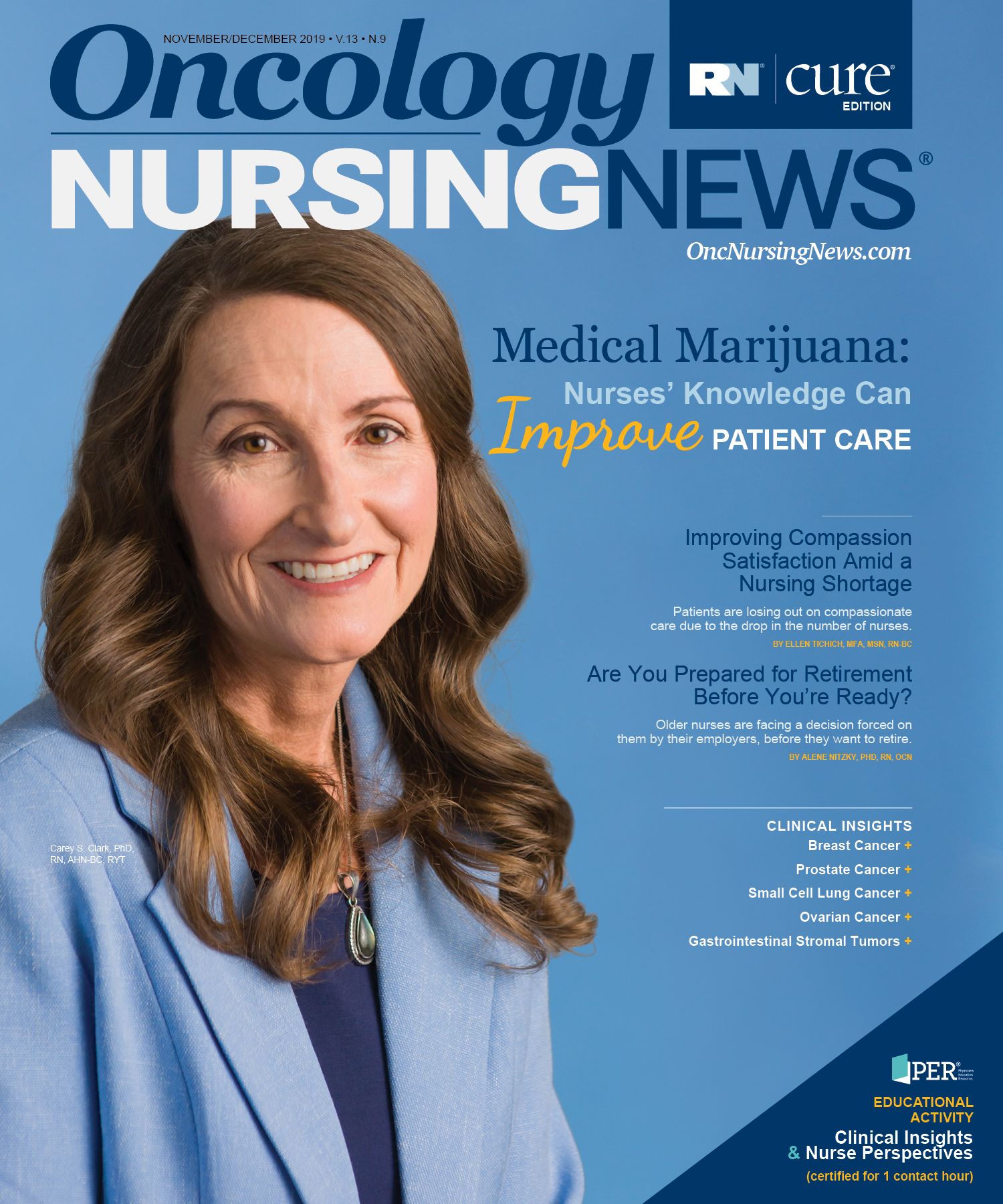Improving Compassion Satisfaction Amid a Nursing Shortage
A nationwide nursing shortage is not only reducing the amount of time oncology nurses have to spend with their patients, but also increasing the risk for burnout and compassion fatigue.
A nationwide nursing shortage is not only reducing the amount of time oncology nurses have to spend with their patients, but also increasing the risk for burnout and compassion fatigue.1 With the need for cancer care projected to outpace the supply of practitioners by 2025, nurses should use their time efficiently and take measures to avoid burnout.2
Nurses at Kaiser Permanente in San Francisco, California took on this problem when they tackled staff inefficiencies in the infusion center by reconfiguring assignments and shift start times. They assigned each nurse to 3 chairs, located together, thereby creating teams in adjacent areas to simplify medication checks and break coverage. In addition, they staggered shift start times by 30 minutes, providing nurses with needed prep time.
Survey results collected after the pilot run (45 shifts) and presented at the 44th Annual Oncology Nursing Society (ONS) Congress showed that nursing satisfaction with patient location, ability to see patients, handoffs to colleagues, and prep time skyrocketed.3 Overall patient satisfaction also improved. The results were impressive enough that plans were made to implement the new workflow throughout the rest of the clinic.
Reducing patient wait times was a project goal set by nurses at the Adult Infusion and Medical Clinic at UF Health, in Gainesville, Florida.4 They recognized that communication problems were delaying treatment start times due to unsigned, incomplete, or unclear orders. Electronic health record dashboard reports and secure messaging were used along with interdisciplinary education, intervention meetings, and communication cards, to reduce patient treatment delays by an average of 6.5 minutes. This quality improvement measure also increased communication within the team. By making a few meaningful changes, the nurses realized a significant difference in workflow and improved satisfaction for patients and staff alike. With less time available for patients, and growing demand for cancer care services, nurses may find themselves suffering from emotional exhaustion, compassion fatigue, or burnout. Victoria Reiser, BSN, RN, ONC, and Judy Zedreck, DNP, MPM, NEA-BC, work at the University of Pittsburgh where they developed personalized self-care toolkits for combating compassion fatigue among nurses at 2 oncology units in the teaching hospital.
The toolkits were rarely used, so they sought to uncover barriers to self-care through focus group discussions based on 4 main themes: leadership, work schedule, acuity and staffing, and personal barriers. They presented the results of their project at the ONS Congress in 2019.5 “Nurses are always putting their patients first,” Reiser shared in a recent interview with Oncology Nursing News®. “They know what compassion fatigue is, and they know what they are doing that puts them at risk, but they really want to be there. They want to take care of their patients.” Reiser says she believes that nurses need self-care to not take them away from the bedside. Rather, that care needs to be built into daily practice, beginning with orientation. “We need to teach nurses to nurture their young nurses and show them what those nurturing habits are.”
Zedrech, who is program coordinator for the university’s Doctor of Nursing Practice Health Systems Executive Leadership Program, agrees and urges administrators and leaders not to assume they know what nurses need. “Whether it’s another nurse, an aide, equipment, or other things, nurses want validation from leadership that the work they do is important, but they have to communicate on the same plane.” She sees burnout not so much as a by-product of the work or the intensity of the job, but of nurses not having the tools they need to do the work they love.
Still, there are ways to help nurses avoid fatigue and burnout. First, return to the basics. Make sure nurses are taking their breaks, especially for meals. Encourage coworkers to talk to each other about their stress and with leadership about solutions. Help staff integrate self-care habits into their work day instead of making it another task to complete. Schedule breaks and make time off the unit part of daily practice. Recruit informal leaders as role models of self-care. The solution does not have to be groundbreaking.
When it comes to fatigue, nurses don’t want to complain. They want to be there for their patients who are suffering and struggling. Reiser shared that “compassion satisfaction is stronger than compassion fatigue. Nurses love this job, and they stay because they derive a lot of satisfaction from caring for these patients.” Zedreck concurred, adding that “people stay when times are rough—when they trust leadership is doing the best they can do.”
References
1. Toh SG, Ang E, Devi MK. Systematic review on the relationship between the nursing shortage and job satisfaction, stress and burnout levels among nurses in oncology/haematology settings. J Evid Based Healthc. 2012;10(2):126-141. doi: 10.1111/j.1744-1609.2012.00271.x.
2. Chandak AN, Loberiza FR Jr, Deras M, Armitage JO, Vose JM, Stimpson JP. Estimating the state-level supply of cancer care providers: preparing to meet workforce needs in the wake of health care reform. J Oncol Pract. 2015;11(1):32-37. doi: 10.1200/JOP.2014.001565.
3. Beringer K, Jansen C, Tejada M, Wong A. Improved nursing infusion workflows, including chair assignment grouping, increase nurse and patient satisfaction. Presented at: ONS 44th Annual Conference; April 11-14, 2019; Anaheim, CA.
4. Pesata B, Farrar R, Harris L. Improving speed, efficiency, and communication of medical oncology patients receiving infusion treatments. Presented at ONS 44th Annual Conference; April 11-14, 2019; Anaheim, California.
5. Reiser V, Zedreck J. Barriers to self-care and combatting compassion fatigue among oncology nurses. Poster presented at: 2019 Creating Healthy Work Environments Conference; February 2019; New Orleans, LA. bit.ly/2PoedbB.
Innovative Program Reduces Nurse Turnover and Fosters Development
Published: September 12th 2024 | Updated: September 12th 2024The US Oncology Network (The Network) has developed one of the most comprehensive programs in the nation to support the professional development and retention of new oncology nurses.



